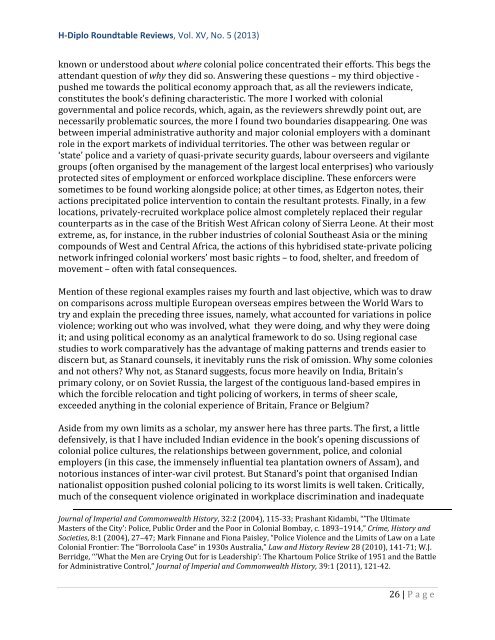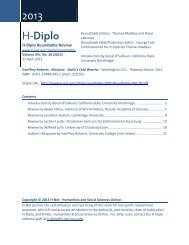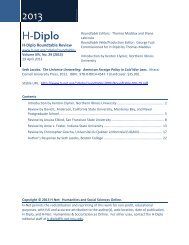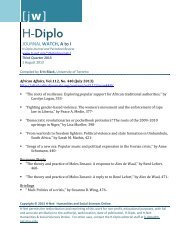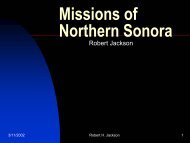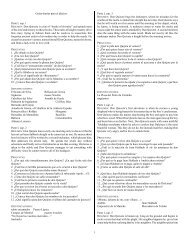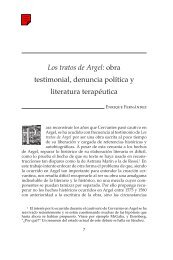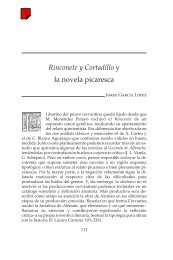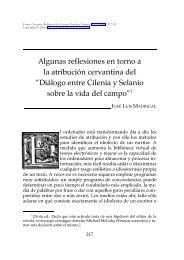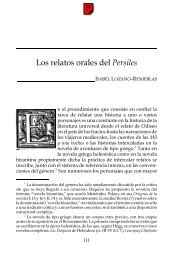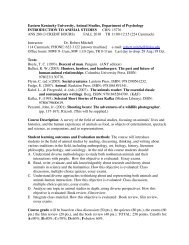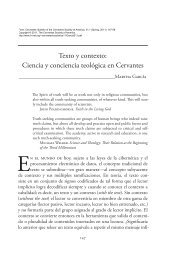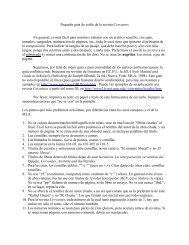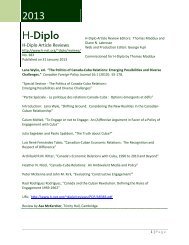H-Diplo Roundtable on Martin Thomas. Violence and ... - H-Net
H-Diplo Roundtable on Martin Thomas. Violence and ... - H-Net
H-Diplo Roundtable on Martin Thomas. Violence and ... - H-Net
Create successful ePaper yourself
Turn your PDF publications into a flip-book with our unique Google optimized e-Paper software.
H-<str<strong>on</strong>g>Diplo</str<strong>on</strong>g> <str<strong>on</strong>g>Roundtable</str<strong>on</strong>g> Reviews, Vol. XV, No. 5 (2013)<br />
known or understood about where col<strong>on</strong>ial police c<strong>on</strong>centrated their efforts. This begs the<br />
attendant questi<strong>on</strong> of why they did so. Answering these questi<strong>on</strong>s – my third objective -<br />
pushed me towards the political ec<strong>on</strong>omy approach that, as all the reviewers indicate,<br />
c<strong>on</strong>stitutes the book’s defining characteristic. The more I worked with col<strong>on</strong>ial<br />
governmental <strong>and</strong> police records, which, again, as the reviewers shrewdly point out, are<br />
necessarily problematic sources, the more I found two boundaries disappearing. One was<br />
between imperial administrative authority <strong>and</strong> major col<strong>on</strong>ial employers with a dominant<br />
role in the export markets of individual territories. The other was between regular or<br />
‘state’ police <strong>and</strong> a variety of quasi-private security guards, labour overseers <strong>and</strong> vigilante<br />
groups (often organised by the management of the largest local enterprises) who variously<br />
protected sites of employment or enforced workplace discipline. These enforcers were<br />
sometimes to be found working al<strong>on</strong>gside police; at other times, as Edgert<strong>on</strong> notes, their<br />
acti<strong>on</strong>s precipitated police interventi<strong>on</strong> to c<strong>on</strong>tain the resultant protests. Finally, in a few<br />
locati<strong>on</strong>s, privately-recruited workplace police almost completely replaced their regular<br />
counterparts as in the case of the British West African col<strong>on</strong>y of Sierra Le<strong>on</strong>e. At their most<br />
extreme, as, for instance, in the rubber industries of col<strong>on</strong>ial Southeast Asia or the mining<br />
compounds of West <strong>and</strong> Central Africa, the acti<strong>on</strong>s of this hybridised state-private policing<br />
network infringed col<strong>on</strong>ial workers’ most basic rights – to food, shelter, <strong>and</strong> freedom of<br />
movement – often with fatal c<strong>on</strong>sequences.<br />
Menti<strong>on</strong> of these regi<strong>on</strong>al examples raises my fourth <strong>and</strong> last objective, which was to draw<br />
<strong>on</strong> comparis<strong>on</strong>s across multiple European overseas empires between the World Wars to<br />
try <strong>and</strong> explain the preceding three issues, namely, what accounted for variati<strong>on</strong>s in police<br />
violence; working out who was involved, what they were doing, <strong>and</strong> why they were doing<br />
it; <strong>and</strong> using political ec<strong>on</strong>omy as an analytical framework to do so. Using regi<strong>on</strong>al case<br />
studies to work comparatively has the advantage of making patterns <strong>and</strong> trends easier to<br />
discern but, as Stanard counsels, it inevitably runs the risk of omissi<strong>on</strong>. Why some col<strong>on</strong>ies<br />
<strong>and</strong> not others? Why not, as Stanard suggests, focus more heavily <strong>on</strong> India, Britain’s<br />
primary col<strong>on</strong>y, or <strong>on</strong> Soviet Russia, the largest of the c<strong>on</strong>tiguous l<strong>and</strong>-based empires in<br />
which the forcible relocati<strong>on</strong> <strong>and</strong> tight policing of workers, in terms of sheer scale,<br />
exceeded anything in the col<strong>on</strong>ial experience of Britain, France or Belgium?<br />
Aside from my own limits as a scholar, my answer here has three parts. The first, a little<br />
defensively, is that I have included Indian evidence in the book’s opening discussi<strong>on</strong>s of<br />
col<strong>on</strong>ial police cultures, the relati<strong>on</strong>ships between government, police, <strong>and</strong> col<strong>on</strong>ial<br />
employers (in this case, the immensely influential tea plantati<strong>on</strong> owners of Assam), <strong>and</strong><br />
notorious instances of inter-war civil protest. But Stanard’s point that organised Indian<br />
nati<strong>on</strong>alist oppositi<strong>on</strong> pushed col<strong>on</strong>ial policing to its worst limits is well taken. Critically,<br />
much of the c<strong>on</strong>sequent violence originated in workplace discriminati<strong>on</strong> <strong>and</strong> inadequate<br />
Journal of Imperial <strong>and</strong> Comm<strong>on</strong>wealth History, 32:2 (2004), 115-33; Prashant Kidambi, “’The Ultimate<br />
Masters of the City’: Police, Public Order <strong>and</strong> the Poor in Col<strong>on</strong>ial Bombay, c. 1893–1914,” Crime, History <strong>and</strong><br />
Societies, 8:1 (2004), 27–47; Mark Finnane <strong>and</strong> Fi<strong>on</strong>a Paisley, “Police <strong>Violence</strong> <strong>and</strong> the Limits of Law <strong>on</strong> a Late<br />
Col<strong>on</strong>ial Fr<strong>on</strong>tier: The “Borroloola Case” in 1930s Australia,” Law <strong>and</strong> History Review 28 (2010), 141-71; W.J.<br />
Berridge, ‘‘’What the Men are Crying Out for is Leadership’: The Khartoum Police Strike of 1951 <strong>and</strong> the Battle<br />
for Administrative C<strong>on</strong>trol,” Journal of Imperial <strong>and</strong> Comm<strong>on</strong>wealth History, 39:1 (2011), 121-42.<br />
26 | P age


